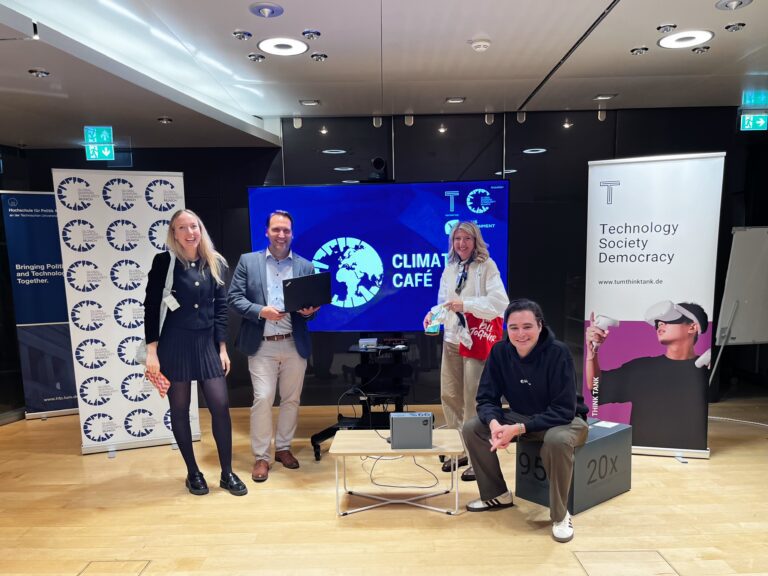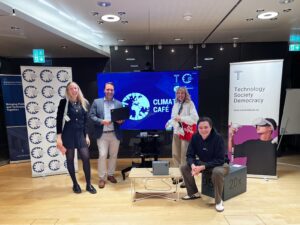
As Becci from The Ocean Package team, I am writing today with a personal reflection that is close to my heart. The core topic: social business.
On 16 October, we had the opportunity to participate in the Climate Café at TUM in Munich. It was an inspiring evening that reinforced our fundamental belief: social business is not just a nice ideal, but the new standard for every future-oriented company. It’s about taking responsibility for society and the resources we have been given.
Why social business is the new standard
The meeting place for enablers: TUM's Climate Café
The Climate Café at the Technical University of Munich is much more than just an event. It is a deliberately created meeting place where a wide variety of people come together: from young to old, from students who are just developing their vision to established founders and entrepreneurs. The room was a colourful mix, reflecting an open, diverse exchange driven by a common concern: the heartbeat for a better, more sustainable future.
That evening, we were invited to present our start-up. The most important insight for me was that we are not alone. Networking with so many enablers of entrepreneurship confirms that change has begun already and that we are an active part of it. Together, we are the driving force for a better future.
It is not about extremes: either business or social issues, but about balance and a healthy middle ground: cooperation instead of confrontation. Openness and tolerance. We can no longer remain stuck in a rigid mindset, but must act more responsibly and innovatively, because our resources are limited.
Evenings like this give us hope, encourage us and confirm that social business should become the norm. Companies that are aware of their responsibility.
Rebeutel and Afb: two further examples of impact
In addition to Ocean Package, we had the privilege of appearing as speakers alongside two other impressive companies that exemplify the concept of social business:
Jutta Esser from Rebeutel explains how she and Waltraud Stitzl perfected the classic upcycling approach. They use existing resources from already available materials. Jutta Esser enthusiastically reported how she transforms FC Bayern Basketball merch T-shirts, which were rejected due to a printing error, into bags, or designs large shopping bags from other discarded fabrics, such as curtains or cushion covers. The world of textiles is infinite. This requires daily innovative thinking and design, which is what makes the profession so exciting. The products are also lovingly handcrafted into unique items in social institutions in Bavaria. As a super nice gesture, she had also brought along various small bags as gifts, which we were all allowed to take home with us.
Afb (Arbeiten für Menschen mit Behindeurng, or Work for people with diabilities) is an outstanding example of how social and economic goals can be combined. In his presentation, Kai Keune emphasised that refurbishing and selling used IT hardware is not just about conserving resources through the upcycling of electronics. The focus is on actively involving people with disabilities by offering them skilled jobs. Afb thus impressively demonstrates that a profit-oriented company can bear profound social responsibility.
These examples show that change has arrived in many industries and that building social businesses works in practice.
This is how Ocean Package lives Social Business in logistics
Our entire corporate philosophy at Ocean Package is designed to have a profound positive impact. Honesty, transparency and authenticity are among our core values. We also see our mission as a social responsibility, as we are solving one of the biggest problems: packaging waste.
1. Responsible cycle: 100% circular
We address the 18.9 million tonnes of packaging waste generated by German online retailers. Our solution is our social promise:
- Drastic reduction: our reusable boxes can be reused up to 20 times. This saves over 95% of waste and up to 80% of CO₂ emissions.
- Closed loop: We are the only provider to follow a clear cradle-to-cradle approach. At the end of the life cycle, we collect all boxes and recycle them 100%. The material flows directly into the production of new boxes.
- Oceanbound plastic: We also use oceanbound plastic from recycled fishing nets in our packaging to actively combat marine pollution.
2. Economic efficiency as a lever for change
Sustainability should not be a luxury.
- Cost savings: Our solution is designed to be cheaper than cardboard packaging from the fourth or fifth shipment onwards, offering cost savings of up to 70% compared to single-use packaging.
- Data transparency: Our software solution is the “brain” of the system. It tracks every box via QR codes and provides transparency on how much CO₂, waste and costs have been saved.
Change is essential
The confirmation from the start-up community at TUM encourages us further. We are on exactly the right track. Change is essential.
Every company has the freedom and responsibility to decide: Will I become part of the new standard that focuses on social business and sustainability? Or will I stick to the old ways?
We at Ocean Package have made our decision.
Relevant content
From the Toilet into the Deep: Wet Wipes in the Ocean
The connection between our bathrooms and the sea is often...
Read MoreSocial Business: How Ocean Package is revolutionising the packaging industry (Munich Insights)
As Becci from The Ocean Package team, I am writing...
Read More
